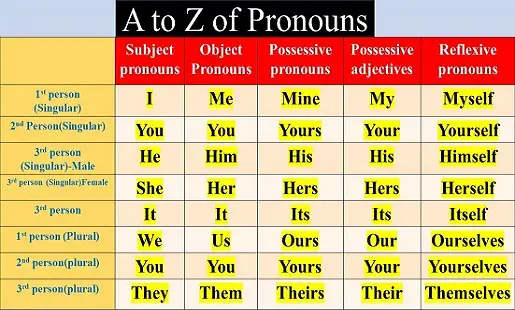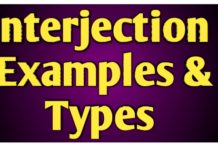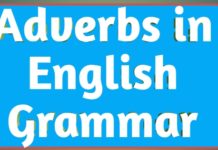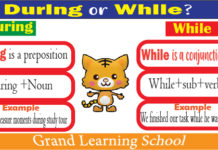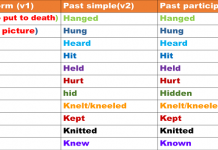List of Pronouns
What is a pronoun?
Let’s discuss the pronoun which is a part of parts of speech. A pronoun is used as the alternative noun. For example – Jone eats rice. In this line, we can use ‘he’ instead of ‘Jone’. Like, He eats rice. Here, This ‘He’ is a pronoun.
George loves to eat rice with fish. He is a gentleman.
See, He is using the alternative of ‘George’. Here ‘He’ means ‘George’ also.
Types of pronouns
There are 8 types of pronouns. They are,–List of Pronouns
a. Personal Pronoun… Example: I, you, they, we, he, she etc.
b. Interrogative Pronoun… Example: Who?, What?, Which? Etc.
c. Distributive Pronoun… Example: Each, Either, Neither etc.
d. Demonstrative Pronoun… Example: This, such, that etc.
e. Relative Pronoun… Example: who, what, which, that etc.
f. Reciprocal Pronoun… Example: Each other, one other etc.
g. Reflexive and Emphatic Pronoun… Example : Myself, yourself, herself etc.
h. Indefinite Pronoun… Example : One, any, some etc.
Pronoun Definition and Examples– in details
a. Personal pronoun
When we use a pronoun instead of any person or thing is called a personal pronoun.
Personal pronouns examples –
I did it.
You can do everything.
They are students.
He is a good boy.
She sings well.
Here I, You, They, He, and She are the personal pronoun.
Types of personal pronouns:
There are three (3) types of personal pronouns. They are-
1. Personal pronoun of the first person
This kind of pronoun is used in the place of first-person. For example: I, we, my, me, our, us, ours, etc.
2. Personal pronoun of the second person
This kind of pronoun is used in the place of the second person. For example- You, yours, your, thou, they, thine, thee, etc.
3. Personal pronoun of the third person
This kind of pronoun is used in the place of the third person. For example – He, she, his, her, they, their, them, etc.
Characteristics of personal pronouns
Personal pronouns change with the change of number, person, and case. For example, I change to we when it is in the plural number. This chart will explain best,
| Case | First-person | Second-person | Third-person |
| Nominative | Singular – I Plural – We | Singular – You Plural- You | Singular – He, She Plural- They |
| Objective | Singular – Me Plural – us | Singular- thou, you, thee Plural- You | Singular – It, him, her Plural- Them |
| Possessive | Singular- My, Mine Plural- Our, Ours | Singular – thine, thy, Your, yours Plural- Your, Yours | Singular – it, his, hers Plural- Their, theirs |
Real-Life Examples of Personal Pronoun:
We are what we believe we are (Said by – Author CS Lewis ) Conscience is the only incorruptible thing about us. (Said by- Henry Fielding) Yesterday isn’t ours to recovers, but tomorrow is ours to win or lose (Said by -Lyndon Johnson)
b. Interrogative pronoun
He is the teacher we met.
In this line, the noun is ‘teacher’, and we know that we use pronouns as an alternative to nouns. Then the question is where we will use an interrogative pronoun? When we will ask a question that is he the teacher we met? Then we can find the answer. By using Who the teacher is not a noun anymore.
For example :
Who is he?
This ‘who’ is a pronoun so interrogative pronoun is that pronoun by which we ask a question. We use Who, Which, and What as interrogative pronouns.
For example :
Who are you? (nominative case)
Whom do you love? (objective case)
Whose pencil is this? (possessive case)
Uses of who, which, what
a. use of who in a sentence
As subject – Who is he? Who are they?
As object- Who do you want? Whom are you looking for?
b. use of which in a sentence
Singular – Which bottle do you want?
Plural- Which of these bottles do you want?
c. use of what in a sentence
Singular – What will you eat?
Plural- What are themes do you need?
C. Distributive pronoun
Distribute means dividing something to everyone. Distributive pronouns are also like this. Distributive pronouns are: each, either…. or, neither… nor, everyone, everybody.
Basically, The pronoun that separates one person or thing from a population of persons or things is called the distributive pronoun.
For example :
Each of them went there.
Each of the men and women is selected.
Either of the two boys is talented.
The two Sisters went to the town.
There are two flowers, neither is good.
Each boy has said this.
Parts of Speech: nouns, verbs, adjectives, adverbs
d. Demonstrative pronoun
Words such as these, that, this, those, so, such are the words that are used instead of some noun. These words are called demonstrative pronouns.
For example :
This is my home.
That is your car.
These are bad plates, but those plates are good.
Use of this, these, that, those as pronouns:
See the chart properly,
| Singular | Plural |
| This | These |
| That | Those |
At the end section, we are trying to show a full list of pronouns.
So it is clear that the main pronoun is this and that and the plural forms are these and those.
This man is good.
These men are good.
That car is beautiful.
Those cars are perfect.
B. Such
When such is used as a demonstrative pronoun it indicates the earlier noun. Before such one must use as.
For example :
He was a teacher, and we believed him to be as such.
C. The same
It is sometimes used as a demonstrative pronoun. At that time ‘as’ is used after ‘the same’.
They did the same as we.
Rahim will do the same as Tina.
D. So
It is used after some verbs. They are: say, think, hope, desire, want, demand etc.
For example :
I don’t think so.
People say so.
e. Relative pronoun
Relative pronouns are used as connectors. For example :
I know the man. He lost the bag.
If I say that I know the man who lost his bag then this will be a relative pronoun. This “who” is a connector of two different lines.
I have lost the book. You gave me the book.
I have lost the book that you gave me. Here that is also a relative pronoun.
The relative pronoun is that pronoun that refers to some noun or pronoun previously mentioned and at the same time, it joins two sentences.
A. Who
It is used only to indicate persons. For example :
This is a man who came to our school.
She is who drew it.
B. Which
It is used only to indicate animals, babies and things. For example :
This is the baby which cried.
This is the book which I bought.
They have a goat which gives the milk a lot.
C. That
It is used both for people and things. For example :
This is a doctor that was taken to the hospital.
D. What
I Understand what you said.
I bought what I liked.
This is what I told you yesterday.
E. But
I know this, but we need to think about safety.
He is poor but honest.
He is wealthy but unkind.
F. As
It is used in many structures. They are,
Such+ noun+ as… For example- we need such people as will vote for the party.
The same+ noun+ as….for example- This dress is the same as that.
As+ adjective + as… for example – He is as fat as I.
So+ adjective + as… for example – He is not so talented as his brother.
G. Who and Which
Restrictive use-
The pen which I bought is missing.
Continuation use –
I went to Rahim, and he told me a story, and it was very amazing.
Adverbial use-
The thief was punished because he stole the gold.
I have bought a pen which I will use for the exam.
H. That
The same+ noun + that…….. This is the same house that my father sold last year.
The only+ noun+ that……… He is the only teacher that can teach us English.
Any+ noun+ that……. I will give it to any boy that can dance well.
All+ noun + that….. He did not get all the money that he needed.
The one+ noun+ that…. The one book that can be used for this topic is this one.
I. As and So
Such+ noun+ as
I want such boys as being honest.
The same+ noun+ as/ that
This is the same book that / as you gave me.
S+ adj+ as+ noun/ pronoun / noun phrase
He is as strong as his father.
So+ adj+ as+ noun/ pronoun / noun phrase
You are not so friendly as your mother.
f. Reciprocal pronoun
Each boy said this.
The five friends talked with one another.
Actually, each and one another are reciprocal pronouns. A reciprocal pronoun is that pronoun is used to indicate between two or many people.
For example :
The ten students love one another.
The two sisters help each other.
g. Reflexive and Emphatic pronoun
Reflexive pronoun
She killed herself.
You fan yourself.
He hurt himself.
Here herself, yourself, and himself are reflexive pronouns.
Moreover, A reflexive pronoun is one used in the objective case in which the meaning of the subject is reflected, indicating that the action of the sentence turns back to the subject.
To know the pronouns in detail a list of pronouns is essential for English learners. For this reason, we are adding a list of pronouns in the final part of the article.
The chart of reflexive pronouns:
| Person | Personal pronoun | Reflexive pronoun | Reflexive pronoun |
| Singular | Plural | ||
| First | I, we | Myself | Ourselves |
| Second | Thou, You | Thyself, Yourself | Yourselves |
| Third | He, She, They, It | Himself, Herself, Itself | Themselves |
Reflexive pronouns examples
a. avail + ref. Pronoun+ of+…
He availed himself of the opportunity.
b. Absent + ref. Pronoun + from+….
She absented herself from the class.
c. Pride+ ref. Pronoun + on+…
Do not pride yourself on Your money.
d. Plume+ ref. Pronoun + on+…
She plumes herself on her beauty.
Caution
1. This pronoun doesn’t stand as subject of verb.
You and I went there.
His father and he did it.
2. It doesn’t stand after-feel and keep.
I feel happy. Not I feel happy.
He keeps away from bad companies. Not he keeps himself away from bad companies.
Emphatic pronoun
The pronoun that is used after a noun or pronoun to add an emphasis on it is called the emphatic pronoun.
I met the president himself.
I went to see it for myself.
She wanted a pen for herself.
I bought it for myself.
Every person should not only think of their own selves, but they should also think about others.
h. Indefinite pronoun
Indefinite means which can not be definite. Many, any, they, none they are the indefinite pronoun.
Many saw the incident.
Any of them will go.
They say that God exists.
Use of some indefinite pronouns
A. Any
Interrogative sentence :
Did any of them go?
Negative sentence :
No, I have not any.
B. Some
Instead of person:
There are many students here some are from class 7 and some are from 5
Instead of things:
There are many pens here, some of them are black and some of them are red.
C. One
No/ every/ each+ one
No one should pass his time.
There are many boys in the class, each one has not done his homework perfectly.
One of+ plural noun
Is this a stricture one doesn’t use here. You must use his, her.
For example :
One of the girls has cooked the food.
One of the cats has broken the bowl.
One of+ pl. Noun+ sing. Verb
One of the four girls has done the homework.
One of the boys worked with the team.
One of my members has done this thesis.
D. Other
To indicate a thing the pronoun ‘other’ does not use for. To indicate things you must use Other things, other places. For example :
Others = other persons
He has bought a bag, a pair of shoes, nail polish and other things.
I have been to Kuakata, Guliakhali, Rangamati and other places.
She gave me a pen, a pencil, a drawing book and other things regarding painting.
E. They
In indefinite pronouns, ‘they’ is used to indicate normal persons. For example :
They believe one must try and find out the way to get out of the problems.
F. Many
It is used only for plural. For example :
Hundreds of people tried to cross the river, but many have failed to do this.
Many are applied, but few are selected for the job.
G. Few
This is also used for plural. For example :
Few people can do this tough work.
Many students tried, but few completed the paragraph without making any mistakes.
list of pronouns
Here is the complete list of pronouns in English Grammar
List of Pronouns
- all
- anybody
- another
- any
- anything
- anyone
- aught
- as
- aught
- both
- each
- each other
- either
- enough
- everybody
- everyone
- everything
- few
- he
- her
- herself
- him
- himself
- his
- I
- idem
- it
- its
- itself
- many
- me
- mine
- most
- my
- myself
- naught
- neither
- no one
- nobody
- nothing
- naught
- one
- one another
- other
- others
- ought
- our
- ours
- ourself
- ourselves
- several
- she
- some
- somebody
- something
- someone
- somewhat
- such
- suchlike
- that
- thee
- their
- theirs
- their self
- themselves
- there
- these
- they
- thine
- this
- those
- thou
- thy
- thyself
- us
- we
- what
- whatever
- whatnot
- whatsoever
- whence
- where
- whereby
- wherefrom
- wherein
- whereinto
- whereof
- whereon
- wherever
- wheresoever
- whereto
- whereunto
- wherewith
- wherewithal
- whether
- which
- whichever
- whichsoever
- who
- whoever
- whom
- whomever
- whoso
- whomsoever
- whose
- whosoever
- ye
- yon
- yonder
- you
- your
- yours
- yourself
- yourselves
So, these were all about List of Pronouns.


